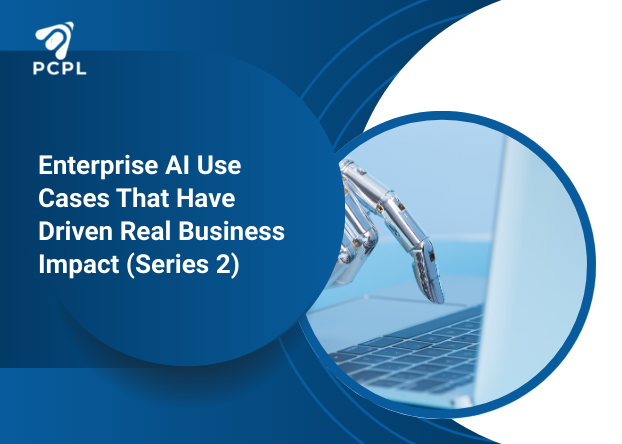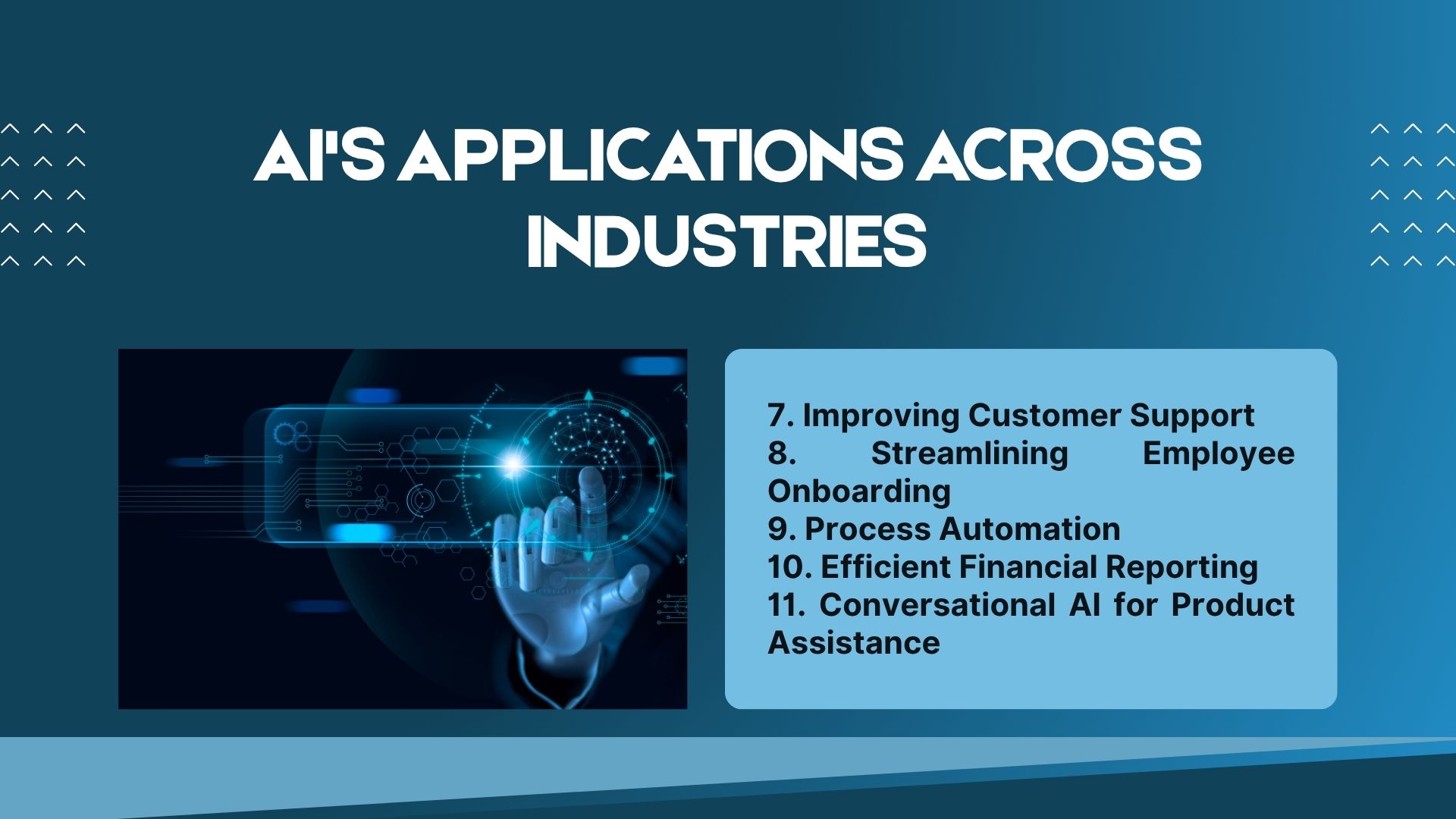
Enterprise AI Use Cases That Have Driven Real Business Impact (Series 2)
Our previous discussion explored AI’s role in creating tailored customer experiences, enhancing safety, optimizing workforces, automating content, improving user authentication, and enabling predictive maintenance. This blog continues that exploration, delving into more impactful AI applications, as promised.

- Improving Customer Support
AI revolutionizes customer support by offering round-the-clock assistance through chatbots, automated responses, and intelligent inquiry routing. This significantly enhances customer satisfaction and reduces wait times, leading to a superior overall product experience.
AI-powered chatbots are a game-changer, providing immediate answers to common questions at any time. For example, a customer can instantly get updates on their order status or return procedures without waiting for a human agent. This speed makes the customer experience far more satisfying.
Further, AI excels at efficiently directing inquiries to the most suitable personnel. If a customer has a specific issue, the AI identifies the best-equipped support agent and routes the inquiry accordingly, accelerating resolution and ensuring customers receive timely assistance.
This technology is widely applied in automated customer service, financial advice, handling various customer queries and technical support, managing service requests and order inquiries, and providing patient support and information.
Success Stories
- Bank of America introduced Erica, an AI-driven virtual assistant, to address customer inquiries and provide financial advice, leading to notable improvements in customer engagement and support efficiency.
- H&M uses AI-powered chatbots to assist shoppers with queries and product recommendations, enriching the overall shopping experience.
- Zendesk has embedded AI to bolster businesses’ customer service operations, offering automated responses and streamlined ticket routing.
- Streamlining Employee Onboarding
AI streamlines the employee onboarding journey by automating paperwork and providing virtual assistants to new hires. This enhances the onboarding experience, accelerates integration, and lessens administrative burdens.
AI also facilitates personalized training programs. Rather than a one-size-fits-all approach, new employees receive training customized to their specific role and experience level, promoting more efficient learning. For example, a new IT department member would receive different training from someone joining the marketing team.
Should a new hire be uncertain about a task or finding information, they can consult the virtual assistant for immediate answers. This reduces the need for new employees to frequently consult managers or colleagues.
This leads to more efficient recruitment and onboarding, personalized training for new hires, streamlined onboarding for retail staff, simplified onboarding for medical personnel, and tailored training for educators.
Examples
- Unilever utilized AI to enhance its hiring and onboarding, employing AI tools for candidate screening and personalized onboarding, which improved employee integration and satisfaction.
- Walmart deploys AI to automate initial training modules for new hires, ensuring consistent and high-quality training delivery while allowing managers to focus on other critical tasks.
- Process Automation
Many roles involve repetitive tasks such as data entry, sending routine emails, or managing inventory. These can be time-consuming and monotonous. AI can automate these processes, executing them swiftly and precisely without fatigue or errors.
Streamlining business processes in this manner significantly boosts overall operational efficiency. By taking over mundane or even hazardous tasks, AI allows employees to dedicate their efforts to more strategic and creative work.
For example, AI can automatically input data into a system, saving employees countless hours each week. It can also dispatch emails to customers or clients based on specific triggers, such as a new product launch or an order shipment, ensuring timely and consistent communication.
This supports automating invoicing, payment processing, and compliance checks; streamlining production and logistics; automating administrative tasks and patient record management; enhancing inventory management and customer service; and automating claims processing and policy management.
Success Stories
- Coca-Cola employs AI to automate its supply chain management, optimizing logistics and inventory, resulting in improved efficiency and reduced operational costs.
- IBM uses Robotic Process Automation (RPA) to streamline business processes by automating repetitive tasks like data entry, customer support, and transaction processing. This technology has enhanced efficiency and accuracy, enabling employees to focus on higher-value work.
- Efficient Financial Reporting
AI elevates financial reporting by automating data collection, analysis, and report generation. This ensures accuracy, compliance, and the timely delivery of financial information, empowering businesses to make informed decisions.
Firstly, AI gathers data from diverse sources. Instead of hours of manual data collection, AI compiles information rapidly, ensuring nothing is overlooked.
Next, AI analyzes the data, identifying patterns, trends, and anomalies that might require closer scrutiny. This ensures the information is accurate and reliable.
Finally, AI generates the financial reports. Rather than manual data entry, AI automatically creates these reports, making them available faster and minimizing errors. Businesses receive important information swiftly, enabling prompt decision-making.
This includes automating financial audits and reporting, providing real-time financial insights and compliance reporting, enhancing financial data analysis and report generation, tracking and reporting on financial performance, and ensuring accurate and timely financial reporting for compliance.
Success Stories
- KPMG uses AI to automate financial auditing and reporting, thus improving accuracy and efficiency while reducing audit completion time.
- Deloitte has integrated AI-driven tools to enhance its financial advisory services, automating complex data analysis and reporting tasks to offer clients with faster and more accurate insights.
- Conversational AI for Product Assistance
Conversational AI provides immediate, intelligent, and natural language interactions, empowering customers with product information and support. This technology significantly enhances the user experience while simultaneously reducing the burden on customer service teams.
Imagine a customer looking for details about a product’s features. Conversational AI can instantly deliver comprehensive information. If an order update is needed, the AI can track it and provide real-time status. Customers can even share their preferences and budget, allowing the AI to recommend ideal product matches. This instant assistance fosters customer satisfaction and a sense of being valued.
Further, conversational AI’s ability to understand natural language allows it to communicate with customers in a genuinely conversational manner. It can interpret diverse phrasings of the same question and respond appropriately, leading to more enjoyable and effective interactions.
This technology transforms customer service by offering immediate product assistance, personalized shopping guidance, technical support and troubleshooting, help with medical inquiries and appointment scheduling, and efficient management of general customer queries and service issues.
Real-World Applications
- L’Oréal uses conversational AI to provide tailored beauty advice and product suggestions to customers both online and in retail stores, which has led to increased customer engagement and sales conversions.
- HP has implemented AI-powered virtual assistants to assist customers in troubleshooting and resolving technical issues with their products, resulting in quicker resolution times and greater customer satisfaction.
Integrating AI into Your Business
Incorporating Artificial Intelligence (AI) into your business operations represents a fundamental shift in how you conduct business. AI has the potential to dramatically improve efficiency, lower costs, and enhance customer satisfaction. This transformative technology is redefining industries by offering solutions that range from highly customized customer experiences to optimized workforce management and sophisticated financial analysis.
The practical applications of AI in business are extensive and impactful, showcasing how organizations are utilizing this technology to tackle real-world challenges. Numerous examples demonstrate that companies across various sectors, from major retail chains to leading technology firms, are already realizing significant advantages from AI integration.
References
https://www.moveworks.com/us/en/resources/blog/enterprise-ai-use-cases-real-world-examples
https://productschool.com/blog/artificial-intelligence/ai-business-use-cases
https://www.ibm.com/think/topics/artificial-intelligence-business-use-cases
